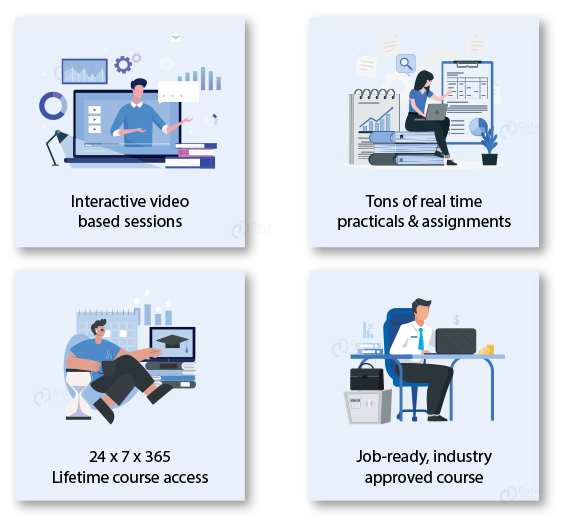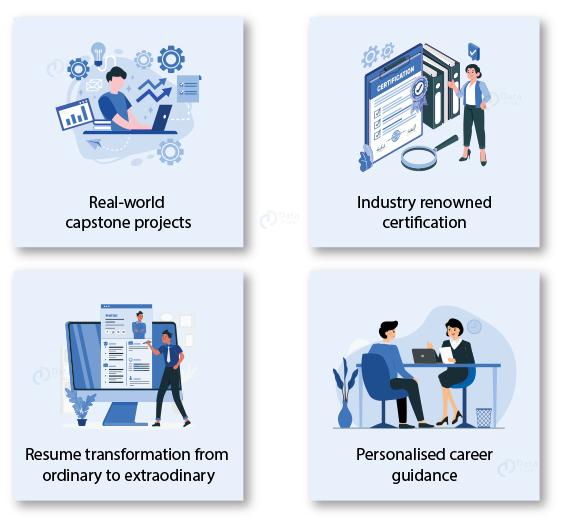Free Advanced Java Certification Course [Hindi]

Knowing a computer language is one of the most important skills in today’s world. Among all languages, Java is currently the most famous and highest paid language. Let’s learn more about advanced Java features in this free course provided by DataFlair.
What will you take home from this Free Advanced Java Course?
- 50+ hrs of self-paced video course
- 170+ hrs of study material, practicals, quizzes
- Acquire practical knowledge which industry needs
- Practical Advanced Java course with real-time case-studies
- Lifetime access with industry renowned certification
Why should you enroll in this Free Advanced Java course?
- Gain useful knowledge and skills from industry level experts
- Get lifetime access to a diverse syllabus, from core to advanced Java including JDBC, JSP, Servlets
- Get a career-boosting certificate after successful completion of the course
- Be offered the job with a handsome salary
- Apply your object oriented programming skills in practical life
- Network with other individuals interested in advanced Java
- Get notifications about the recent advancements in JDBC, servlets, JSP and current best practices
- Learn and complete the course any time at your own pace
- Gain practical knowledge through hands-on coding exercises and projects
- Improve your existing programming skills with advanced level Java
- Practical JDBC course with real time problems and case studies
- Troubleshoot common Java related problems
Advanced Java Course Objectives
Welcome to this comprehensive course in Advanced Java (JDBC, JSP, Servlets) Programming by DataFlair. This course will help you in developing strong fundamentals of Java. The skills acquired in this Advanced Java course will definitely help you in your holistic growth.
This Advanced Java course first builds a strong understanding of JDBC Technology. Then, this Advanced Java course teaches about more advanced topics like the architecture of JSP and servlet. It also covers topics like JSTL, custom tags, expression language, Web page, Java MVC, Struts, asynchronous servlet, metadata etc.
This is a self paced course, which lets you learn at your own preferred pace and comfort.This Advanced Java course has a total of 20 hours of video lectures covering all important topics of Java. It also gives the students access to more than 300 articles on important topics of advanced Java. It has downloadable resources and gives the users a full time access and certificate of completion. Hence this Advanced Java course is a must have for all those interested in object oriented JAVA.
This Advanced Java course focuses on both practical and theory. After taking this class, developers can build well performing, and scalable Web applications that, and that are easier to maintain.
After completing this Advanced Java course, you’ll be able to interact with and query any basic to intermediate level Java problems. You can also generate reports with ease, and answer questions based on some software’s performance. Further you can build advanced websites with user friendly settings.
You will also get to work with many peers who think in the exact direction as you.You can also gain hands on knowledge from industry experts. Hence this Advanced Java course will help you in making new connections over a wide network. Also you can talk to many industry experts who have been through the same phase as you.
You will be able to enhance your skill set and improve your CV. This will improve your skills of getting a better job and if you are already doing a job, this Advanced Java course will increase the chances of your promotion based on acquired skills.
Access to a comprehensive curriculum covering both core Java and advanced topics: This Advanced Java course curriculum will cover both the fundamentals and advanced concepts of Java programming. Hence it’ll provide an all rounder experience.
Why should you learn Advanced Java?
- “Java and JavaScript may share a similar name, but they are distinct in nature, just like a car and a carpet” was the statement given by Chris Heilmann after he compared Java to JavaScript.
- According to payscale.com, the average salary of a beginner knowing JDBC and Servlets ranges between 9-10 LPA INR.
- Moreover, Java is platform independent,and runs on different operating systems and devices
- As per knowledgehut.com, the average salary of a Java developer in the US $47,100 – $154,000 per year.
- James Gosling once rightly said that Java is C++ without the guns, clubs and knives.”
- Many popular gaming applications like Minecraft, Desktop applications like IntelliJ, Mobile operating systems like Android and Financial applications for companies like Citibank use Java
What is Advanced Java?
Java is a widely-used, object-oriented programming language. It’s famous for its user friendliness and portability. It was first created in May 1995 by James Gosling under Sun Microsystems. It is currently owned by Oracle Corporation. The language is famous due to its easy syntax and cross-platform compatibility, and can be executed on any platform with Java Virtual Machine (JVM) support. This inherent platform-independence empowers Java programs to operate seamlessly on diverse devices and operating systems, ranging from personal computers and mobile devices to embedded systems and enterprise-grade servers. Java is versatile, robust and safe for users which makes it highly demanding. Java Database Connectivity is an application programming interface for the Java programming language which defines a clientele’s access to a database. It is a data access technology used to enhance Java database connectivity. In simple terms, JDBC helps you to write Java applications. It was released in 1997 by Sun Microsystems. A servlet is a Java programming language class. It is used to extend the capabilities of servers that host applications accessed by a request-response programming model JSP (JavaServer Pages) is a popular web development application solution for the Java programming language. JSP helps developers to make dynamically generated HTML web pages. JSP is similar to PHP, but it uses the powerful Java programming language instead.What to do before you begin?
- One must have basic Knowledge of Core Java
- Knowing Web technologies like HTML and HTTP is helpful but not compulsory
- To make the most out of this Java course, it is beneficial to have a basic understanding of programming concepts such as variables, data types, control flow, and functions
- To make the course time effective, one must be self motivated with a passion for problem-solving
Who should go for this free Advanced Java course?
The following people must go through this free Advanced Java course –- Software Developers and IT Professionals who want to upgrade their careers
- Java and JDBC Administrators who want to learn advanced programming skills for a promotion in their jobs
- Project Managers who want to improve their resume through the course certificate
- Technical and software consultants who need to analyse and debug the functioning of Java based websites
- Those who want a career in SQL development
- All the beginners who want to enhance their skill set
- Web and back-end developers who aim to enhance their skill of server side development
- Professionals switching career to Java based jobs
By enrolling in our Advanced Java course, you can expect the following benefits:
The trainees of this Advanced Java course will have certain benefits that include –- Descriptive curriculum covering the core concepts and advanced topics of Java programming
- The assignments attached to the course will help you in practical application of your skills to the real world.
- Guidance from experienced industry experts
- Flexible learning options – you can learn the course anytime and from anywhere at your suitable pace
- You can form networks with your peers and mentors from the learning group where you’ll be added during the course.
- Knowing JSP and Servlets can get you a job and cause promotion in your job.
- This course will help you to speed up with JSP and Servlets. The teachers of the course will answer all doubts of the learners within as fast as 2-3 hours.
- You’ll learn how to read and write tough programs using Java
- The course will also help you to crack job interviews about Java and related skills
- After the training , you can immediately start making basic websites using Java, JDBC, servlets and JSP
- using string operations and comparison operations to solve advanced queries.
- You can use logical operators to add logic flow to your Java queries
- Learn common Java commands and Standard actions like forward, param, usebean, setproperty and getproperty
- You can learn the Java architecture as well as client/server relation
- Build a fully functioning JSP/Servlet web application
- Set up Java development environment using Tomcat and Eclipse
- Explore JSP elements like Expressions, Scriptlets, keywords and Declarations
- Using HTML and HTPPS to make websites
- Participants can confidently build a MVC application using JSP and Servlets
- Add database support and build complete database application with JDBC
Jobs after Learning this Advanced Java Course
Upon successful completion of this extensive Advanced Java course, you will gain top notch skills that will help you get job opportunities in the Java development domain. Moreover, the demand for Java professionals has been significantly increasing in the corporate world. One can combine front-end and back-end development skills, use Java for server-side programming, creating and debugging dynamic user interfaces. The potential job roles that you can explore are as follows:-- Software Engineer
- Java Architect
- Enterprise Application Developer
- Technical Lead
- Technical Consultant
- Software consultant
- University professor
- Software developer: knowing Java is considered a boon for a software engineer though not a necessity. Those who are prompt in Java have more chances of being paid more than their peers.
- College professor: A keen knowledge of advanced Object oriented Java will help you in gaining skills such that you can teach courses of Java to University students.
- Freelancer: After gaining enough knowledge, you can get foreign clienteles whose work is based on building web applications using JDBC, JSP and servlets.
- Backend developer: Back-end developers create, maintain and debug the server side end of a technological platform. Knowledge of Java is a great quality in such cases.
- Java Developer: The work of a Java developer is to develop and maintain Java applications, and utilising its libraries properly.
- Full-stack Developer: Combine front-end and back-end development skills, using Java for server-side programming and creating dynamic user interfaces.
- Android App Developer: one can build a mobile application, usually a gaming application for using Java and the Android SDK for mobile phones.
- Web Application Developer: Develop web applications using Java frameworks like Spring or JEE, considering all the data safety measures.
- Consultant: Offering consulting services in Java development by assisting organisations in upgrading their softwares is a great job.
Our students are working in leading organizations

Online Advanced Java Free Training Course Curriculum
- About Java Platforms
- Runtime Polymorphism
- Java Applications
- API (Application Programming Interface)
- Static Blocks
- Introduction to persistence
- File management system and its disadvantages
- Database management system and its Advantages
- Introduction to JDBC
- JDBC Packages
- Why JDBC? & ODBC Vs JDBC
- Vendor specific library
- X/Open standards
- ODBC standards
- JDBC standards and its Advantages
- What is a JDBC Driver?
- JDBC architecture
- JDBC Driver Types
- Net-Protocol all/pure java driver
- Native-Protocol pure java driver
- Auto-loading of JDBC driver class
- Connection management enhancements
- Support for RowIdSQL type
- SQL XML support
- Server side technologies
- Need of server side technologies
- Client side technologies
- What is Servlet? & Advantages of Servlet
- Difference between CGI and Servlet
- JEE technology and its components
- Enterprises Application
- Web Application and its types
- Presentation and Service oriented Web Application
- Providing Servlet Metadata Using Annotations
- Understanding Asynchronous Servlet
- Servlet API – Versions and Packages
- Servlet Container and its Responsibilities
- Servlet interface – methods
- Deployment descriptor file (web.xml)
- What is deployment?
- Types of deployments
- Tool and Console deployment
- Methods of ServletRequest
- request parameters and headers
- Methods of ServletResponse and its generation
- MIME types
- Introduction
- Methods of ServletConfig
- GenericServlet introduction
- Methods of GenericServlet
- ServletContext introduction
- Methods
- Context init parameters and defining them in web.xml
- JSP – Advantages and Applications
- Difference between JSP & Servlet
- JSP Life cycle, JSP Lifecycle methods
- jspDestroy, Saving jsp file as a,
- Public and Private resource
- tags
- What is scripting elements
- Types of scripting elements
- jsp implicit object and its need
- Implicit objects of jsp
- Request, Response, Page
- Introduction and types
- Page and Include directive
- Taglib directive
- What is standard action
- Standard actions – include, forward, param, usebean, setproperty and getproperty
- Using Java Bean in JSP
Features of Advanced Java Free Course


